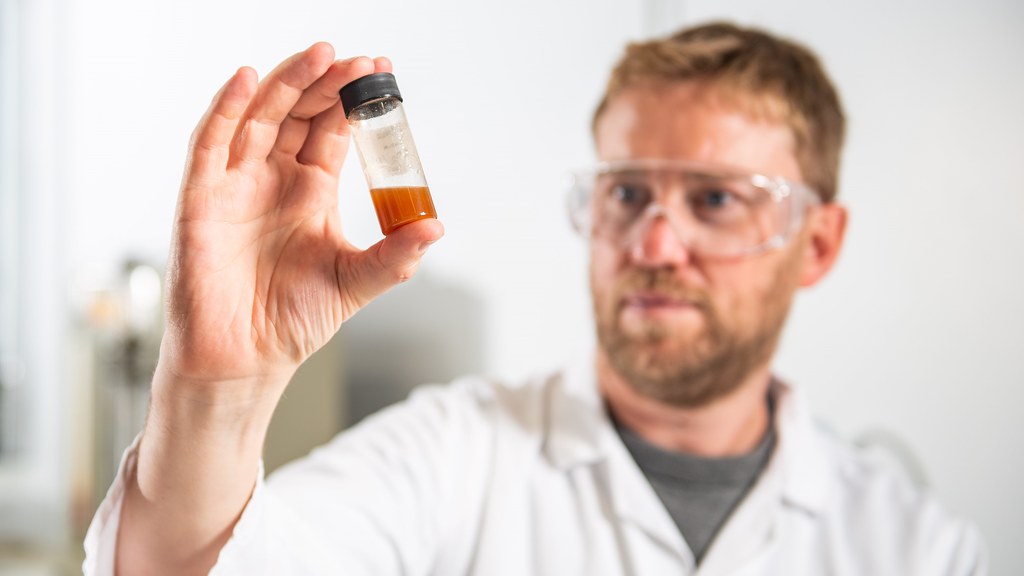A yeast-based alternative to palm oil, developed at Bath to reduce the environmental impact of a range of food products, has taken a step closer to production following a major investment.
Clean Food Group - a UK-based food-tech business developing cultivated food, has acquired the intellectual property and the process developed by a cross-disciplinary team based in the University’s Department of Chemical Engineering as part of an investment of up to £1.8 million.
The revolutionary cell culture based alternative could help reduce the detrimental environmental impact of a range of palm-based ingredients that can be found in nearly 50% of all packaged products found on our supermarket shelves.
Christopher Chuck, Professor of Bioprocess Engineering in Bath’s Department of Chemical Engineering, leads the team that developed the product and the process involved in making it. A dedicated Clean Food Group lab will be set up in the Department as part of the deal, while Prof Chuck will take up a technical advisor role within the company.
Prof Chuck says the acquisition and further investment to scale the technology will bring closer to market a range of more sustainable products displacing palm oil. He says: “Our dependence on palm oil comes at a great environmental cost. We’ve worked over many years to create robust palm oil alternatives that give us a real chance to cut the impact of a range of products that until now have only been possible to produce with palm oil and the deforestation, pollution and emissions that come with it.”
Prior to the acquisition, more than £4.4 million had been spent developing the technology to the stage where it is ready for scale-up and commercialisation.
Clean Food Group is further investing in the development of a large-scale pilot plant and securing regulatory approval for new products.
The challenge of replacing palm oil
Palm oil is an ingredient in many widely used products ranging from cakes and instant noodles, as well as cosmetics including lipstick and shampoo. Its versatility, derived from its relatively low production costs, high melting point and high levels of saturated fats, is key to its ubiquity. However, its rapid growth as a crop over recent years has been associated with severe deforestation, water and air pollution, and increased greenhouse gas emissions across South East Asia.
The new yeast-based palm oil alternative, and several of its components, will be further developed with a view to them replacing existing food product ingredients that contribute to deforestation. These components include a palm oil substitute and synthetic proteins that are a direct replacement for soybean proteins. Alongside that, the project will work on using the ‘whole cell’ of the yeast product in a range of new meat alternative foods.
The global palm oil market was valued at US $50.6 billion in 2021 and is expected to reach US $65.5 billion by 2027. However, palm oil production continues to be a major driver of deforestation of some of the world’s most biodiverse habitats, impacting critically endangered species like the orangutan, pygmy elephant and Sumatran rhino. This process combined with the conversion of carbon-rich peat soils, is issuing millions of tonnes of greenhouse gases into the atmosphere, contributing to climate change. Associated issues of exploitation of workers and child labour are also a significant concern.
Alex Neves, co-founder and CEO of Clean Food Group says: “We are delighted to work with Professor Chris Chuck and his growing Clean Food Group team at the University of Bath to bring a commercially viable and sustainable alternative to palm oil to market.
“We are well placed to take the next step on the path to bringing our palm oil alternative, an ingredient with the potential to solve substantial environmental, food security, health and working environment challenges within the incumbent palm oil supply chain, to market.”
“In addition to our acquisition of the intellectual property for the palm oil alternative technology and our collaboration with the University of Bath to scale the technology, we will be investing in securing regulatory approval for our palm oil alternative ingredients in multiple markets. We will also be investing in the development of a large-scale pilot plant which will allow us to enter into meaningful collaborations with commercial partners and to demonstrate our palm oil alternative within finished products. We have already received significant market interest with regards to this.”
Bath’s growing expertise in cellular agriculture
Prof Chuck’s work builds on previous research into palm oil alternatives carried out at The University of Bath’s Departments of Chemical Engineering, Mechanical Engineering and Biology & Biochemistry. Bath has built a reputation as a leader in cellular agriculture, with other projects developing new processes to make the production of cellular-based meat alternatives taking place in Chemical Engineering.
The new agreement will fund two post-doctoral research associates, two PhDs, and utilise the Department of Chemical Engineering’s scale-up facilities.
The Technology Transfer Team in Research and Services (RIS) at the University was involved in facilitating the partnership with the Clean Food Group to commercialise the technology.
You can read more about Prof Chuck’s work to replace palm oil in our Research with Impact feature.

